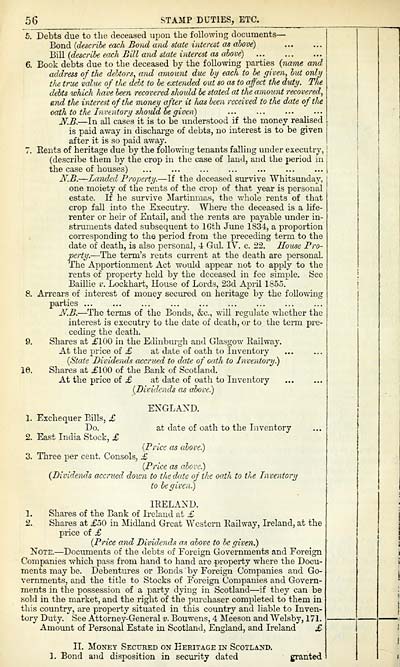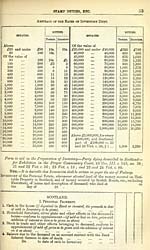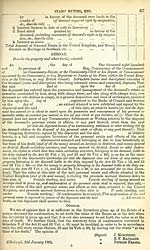Download files
Complete book:
Individual page:
Thumbnail gallery: Grid view | List view

56
STAMP DUTIES, ETC.
5. Debts due to the deceased upon the following documents —
Bond {describe each Bojid and state interest as above)
Bill {describe each Bill and state interest as cAove)
6. Book debts due to the deceased by the following parties {naine and
address of the debtors, and amount due by each to be given, but only
the tru£ value of the debt to be extemled out so as to affect the duty. The
debts which have been recovered shoidd be stated at the amount recovered,
and the interest of the money after it lias been received to the date of the
oath to the Inventory should be given) ... ... ... _ ...
Jf.B. — In all cases it is to be understood if the money realised
is paid away in dischai'ge of debts, no interest is to be given
after it is so paid away.
7. Eents of heritage due by the following tenants falling under executry, !
(describe them by the crop in the case of land, and the period in
the case of houses)
N.B. — Landed Property. — If the deceased survive Whitsunday,
one moiety of the rents of the crop of that year is personal
estate. If he survive Martinmas, the whole rents of that
crop fall into the Executry. Where the deceased is a life-
renter or heir of Entail, and the rents are payable under in-
struments dated subsequent to 16th June 1834, a proportion
corresijonding to the period from the preceding term to the
date of death, is also personal, 4 Gul. IV. c. 22. House Pro-
perty. — The term's rents current at the death are personal.
The Apportionment Act would appear not to apply to the
rents of j)roperty held by the deceased in fee simple. See
Eaillie v. Lockhart, House of Lords, 23d April 1855.
8. Arrears of interest of money secured on heritage by the following
parties ...
N.B. — The terms of the Bonds, &c., will regulate whether the
interest is executry to the date of death, or to the term pre-
ceding the death.
Shares at £100 in the Edinburgh and Glasgow Eailway.
At the price of i> at date of oath to Inventory
{State lyividends accrued to date of oath to Inventory)
Shares at £100 of the Bank of Scotland.
At the price of £ at date of oath to Inventory
{Dividends as above)
9
16.
EXGLAXD.
at date of oath to the Inventory
1. Exchequer Bills, £
Do.
2. East India Stock, £
{Price as above)
3. Three per cent. Consols, £
{Price as above)
{Dividends accrued doivn to the date of the oath to the Inventory
to le given)
IRELAND.
1. Shares of the Bank of Ireland at £
2. Shares at £50 in Midland Great Western Railway, Ireland, at the
price of £
{Price and Dividends as above to be given.)
Note. — Documents of the debts of Foreign Governments and Foreign
Companies which pass from hand to hand are property where the Docu-
ments may be. Debentures or Bonds by Foreign Companies and Go-
vernments, and the title to Stocks of Foreign Companies and Govern-
ments in the possession of a party dying in Scotland — if they can be
sold in the market, and the right of the purchaser comjileted to them in
this country, are property situated in this coimtry and liable to Inven-
tory Duty. See Attorney-General v. Bouwens, 4 Meeson and Welsby, 171.
Amount of Personal Estate in Scotland, England, and Ireland £
II. Money Secured ox Eeritage in Scotland.
3. Bond a)id disj-iosition in security dated granted
STAMP DUTIES, ETC.
5. Debts due to the deceased upon the following documents —
Bond {describe each Bojid and state interest as above)
Bill {describe each Bill and state interest as cAove)
6. Book debts due to the deceased by the following parties {naine and
address of the debtors, and amount due by each to be given, but only
the tru£ value of the debt to be extemled out so as to affect the duty. The
debts which have been recovered shoidd be stated at the amount recovered,
and the interest of the money after it lias been received to the date of the
oath to the Inventory should be given) ... ... ... _ ...
Jf.B. — In all cases it is to be understood if the money realised
is paid away in dischai'ge of debts, no interest is to be given
after it is so paid away.
7. Eents of heritage due by the following tenants falling under executry, !
(describe them by the crop in the case of land, and the period in
the case of houses)
N.B. — Landed Property. — If the deceased survive Whitsunday,
one moiety of the rents of the crop of that year is personal
estate. If he survive Martinmas, the whole rents of that
crop fall into the Executry. Where the deceased is a life-
renter or heir of Entail, and the rents are payable under in-
struments dated subsequent to 16th June 1834, a proportion
corresijonding to the period from the preceding term to the
date of death, is also personal, 4 Gul. IV. c. 22. House Pro-
perty. — The term's rents current at the death are personal.
The Apportionment Act would appear not to apply to the
rents of j)roperty held by the deceased in fee simple. See
Eaillie v. Lockhart, House of Lords, 23d April 1855.
8. Arrears of interest of money secured on heritage by the following
parties ...
N.B. — The terms of the Bonds, &c., will regulate whether the
interest is executry to the date of death, or to the term pre-
ceding the death.
Shares at £100 in the Edinburgh and Glasgow Eailway.
At the price of i> at date of oath to Inventory
{State lyividends accrued to date of oath to Inventory)
Shares at £100 of the Bank of Scotland.
At the price of £ at date of oath to Inventory
{Dividends as above)
9
16.
EXGLAXD.
at date of oath to the Inventory
1. Exchequer Bills, £
Do.
2. East India Stock, £
{Price as above)
3. Three per cent. Consols, £
{Price as above)
{Dividends accrued doivn to the date of the oath to the Inventory
to le given)
IRELAND.
1. Shares of the Bank of Ireland at £
2. Shares at £50 in Midland Great Western Railway, Ireland, at the
price of £
{Price and Dividends as above to be given.)
Note. — Documents of the debts of Foreign Governments and Foreign
Companies which pass from hand to hand are property where the Docu-
ments may be. Debentures or Bonds by Foreign Companies and Go-
vernments, and the title to Stocks of Foreign Companies and Govern-
ments in the possession of a party dying in Scotland — if they can be
sold in the market, and the right of the purchaser comjileted to them in
this country, are property situated in this coimtry and liable to Inven-
tory Duty. See Attorney-General v. Bouwens, 4 Meeson and Welsby, 171.
Amount of Personal Estate in Scotland, England, and Ireland £
II. Money Secured ox Eeritage in Scotland.
3. Bond a)id disj-iosition in security dated granted
Set display mode to: Large image | Transcription
Images and transcriptions on this page, including medium image downloads, may be used under the Creative Commons Attribution 4.0 International Licence unless otherwise stated. ![]()
| Scottish Post Office Directories > Towns > Edinburgh > Post Office Edinburgh and Leith directory > 1863-1864 > (60) |
|---|
| Permanent URL | https://digital.nls.uk/83118545 |
|---|
| Description | Directories of individual Scottish towns and their suburbs. |
|---|
| Description | Around 700 Scottish directories published annually by the Post Office or private publishers between 1773 and 1911. Most of Scotland covered, with a focus on Edinburgh, Glasgow, Dundee and Aberdeen. Most volumes include a general directory (A-Z by surname), street directory (A-Z by street) and trade directory (A-Z by trade). |
|---|


